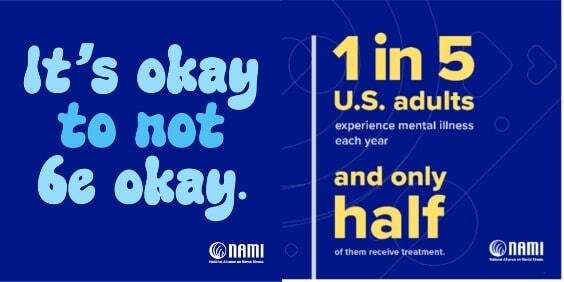May 2024 - Mental Health Awareness Month
Since its inception in 1949, Mental Health Awareness Month has designated as time to focus on the challenges faced by millions of Americans living with mental health conditions. Throughout May, people throughout the country will actively participate in this national movement, dedicated to eradicating stigma, extending support, fostering public education, and advocating for policies that prioritize the well-being of individuals and families affected by mental illness. Mental Health Awareness Month provides a perfect opportunity to shine a spotlight on mental health resources, local programs and initiatives, as well as helpful information that is available for specific populations such as caregivers, youth and young adults and underrepresented communities.
Trying to tell the difference between what expected behaviors are and what might be signs of a mental illness isn’t always easy. There’s no easy test that can let someone know if there is mental illness or if actions and thoughts might be typical behaviors of a person or the result of a physical illness.
Each illness has its own symptoms, but common signs of mental illness in adults and adolescents can include the following:
- Excessive worrying or fear
- Feeling excessively sad or low
- Confused thinking or problems concentrating and learning
- Extreme mood changes, including uncontrollable “highs” or feelings of euphoria
- Prolonged or strong feelings of irritability or anger
- Avoiding friends and social activities
- Difficulties understanding or relating to other people
- Changes in sleeping habits or feeling tired and low energy
- Changes in eating habits such as increased hunger or lack of appetite
- Changes in sex drive
- Difficulty perceiving reality (delusions or hallucinations, in which a person experiences and senses things that don’t exist in objective reality)
- Inability to perceive changes in one’s own feelings, behavior, or personality
- Overuse of substances like alcohol or drugs
- Multiple physical ailments without obvious causes (such as headaches, stomach aches, vague and ongoing “aches and pains”)
- Thinking about suicide
- Inability to carry out daily activities or handle daily problems and stress
- An intense fear of weight gain or concern with appearance
Mental health conditions can also begin to develop in young children. Because they’re still learning how to identify and talk about thoughts and emotions, their most obvious symptoms are behavioral. Symptoms in children may include the following:
- Changes in school performance
- Excessive worry or anxiety, for instance fighting to avoid bed or school
- Hyperactive behavior
- Frequent nightmares
- Frequent disobedience or aggression
- Frequent temper tantrums
Where To Get Help
Don’t be afraid to reach out if you or someone you know needs help. Learning all you can about mental health is an important first step.
Reach out to your health insurance, primary care doctor or state/county mental health authority for more resources.
Contact the NAMI HelpLine to find out what services and supports are available in your community.
If you or someone you know is struggling or in crisis, help is available. Call or text 988 or chat 988lifeline.org to reach the 988 Suicide & Crisis Lifeline.



